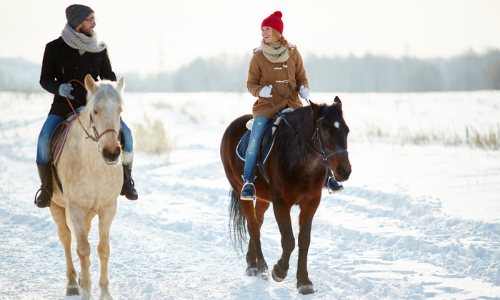
5 Ways to Make Winter Horseback Rides Safer for Your Horse
Just like people, horses need exercise no matter what the season. Scheduling regular horseback rides will help your horse remain active, engaged, and ensure that you have ample time to spend with your favorite equine. Before you saddle up your horse, keep these winter tips in mind.
1. Check the Conditions Outdoors and the Forecast
Venturing out when the snow is deep or the trails are icy can result in injuries for your horse and you. Although conditions may be just fine around the barn, drifting snow or icy patches may be present just a short distance away. If you're not sure what conditions you'll find on your ride, it may be a good idea to postpone your ride or limit it to nearby fields or pastures.
If you're planning a fairly long ride, a glance at the forecast and radar is a must before you head out. The weather can change quickly during the winter, sometimes with little warning. Riding through freezing rain, hail or a snow squall can be uncomfortable at best and dangerous at worst. Slippery conditions and poor visibility may make your horse lose its footing, causing a fall.
2. Warm-Up Before Your Ride
When it's cold outside, both you and your horse can benefit from a few preliminary exercises. A few stretches will loosen your muscles and keep you limber during your ride. Before you begin the ride, spend 5 or 10 minutes trotting around the pasture or trailhead to warm up your horse's muscles and tendons.
3. Make Your Horse Comfortable
A blanket or rump rug will keep your horse warm on cold rides. If you don't normally use a blanket, place it over your horse's back before your planned ride. Giving your horse time to get used to the unfamiliar sensation will help you ensure that the ride starts off on a positive note.
Don't forget to warm the bit by rubbing it between your hands before putting it in your horse's mouth. The freezing cold metal can be quite uncomfortable for your horse if you don't warm it first.
4. Protect Your Horse's Feet
If you and your horse will be riding often during the winter, ask your farrier if he or she recommends special shoes that offer better traction. Horse and Rider magazine notes that horseshoe nails with ribbed heads, studs, or borium attached to shoes, or hoof boots that have removable studs, can be helpful.
Be sure to check your horse's feet for snow and ice balls after your ride. If you don't remove the balls promptly, your horse may slip or experience stretched or damaged tendons.
5. Allow Plenty of Time for Cool Down
Walking your horse for 5 or 10 minutes after your ride will allow time for sweat and heat to dissipate. Equus suggests covering your horse with a cooler made of wool or a synthetic fabric that wicks away moisture during the cool-down period.
Your horse's blanket will probably be soaked with sweat after a ride. Unfortunately, exposure to cold temperatures when wet can chill your horse and may even drop its temperature. If you don't dry your horse with a towel or use a cooler during cool down, its body temperature can drop, which may increase the risk of illness.
Is your horse ready for winter riding? If you have a question or concern about your horse's winter readiness, get in touch with our office.
Sources:
Horse and Rider: 6 Best-Ever Tips for Winter-Riding Fun, 11/25/19
Equus: Tips for Cooling Down After Winter Rides, 2/26/19
Sport and Trail Magazine: Winter Riding Tips by the Trailmeister
Cummings School of Veterinary Medicine: Maintaining Hoof Health in the Winter, 11/9/18
